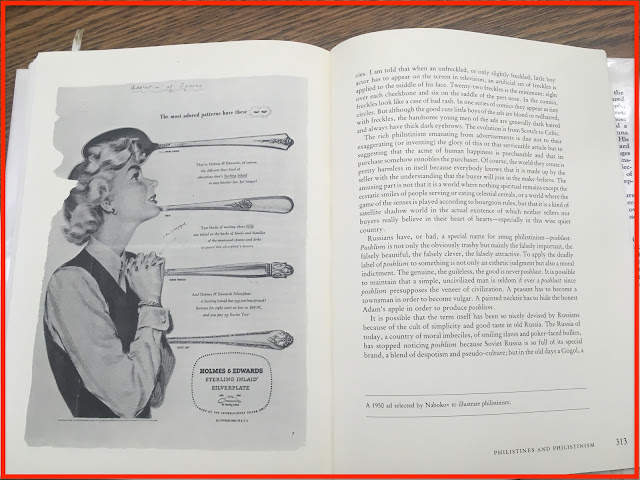Vladimir Nabokov -- Lectures on Russian Literature: Checkhov, Dostoevski, Gorki, Gorgol, Tolstoy, Turgenev, edited by Fredson Bowers, c. 1981.
The writers:
- Nikolay Gogol: 1809 - 1852
- Ivan Turgenev: 1818 - 1883
- Fyodor Dostoevski: 1821 - 1881
- Leo Tolstoy: 1828 - 1910
- Anton Chekhov: 1860 - 1904
- Maxim Gorki: 1868 - 1936
From wiki:
The Hogarth Press is a book publishing imprint of Penguin Random House that was founded as an independent company in 1917 by British authors Leonard Woolf and Virginia Woolf. It was named after their house in Richmond (then in Surrey and now in London), in which they began hand-printing books as a hobby during the interwar period.
Hogarth originally published the works of many members of the Bloomsbury group, and was at the forefront of publishing works on psychoanalysis and translations of foreign, especially Russian, works.
In 1938, Virginia Woolf relinquished her interest in the business and it was then run as a partnership by Leonard Woolf and John Lehmann until 1946, when it became an associate company of Chatto & Windus
In 2011, Hogarth Press was relaunched as an imprint for contemporary fiction in a partnership between Chatto & Windus in the United Kingdom and Crown Publishing Group in the United States, which had both been acquired by Random House.
History
Printing was a hobby for the Woolfs, and it provided a diversion for Virginia when writing became too stressful.
The couple bought a handpress in 1917 for £19 (equivalent to about £1295 in 2018) and taught themselves how to use it. The press was set up in the dining room of Hogarth House, where the Woolfs lived, lending its name to the publishing company they founded
In July, 1917, they published their first text, a book with one story written by Leonard and the other written by Virginia.
Between 1917 and 1946 the Press published 527 titles.
It moved to Tavistock Square in 1924.
1917: what an interesting year to have published their first book.
- Russian civil war: 1917 - 1923.
See: rare books.
Boris Pasternak: 1890 - 1960.
Reka Flessner: 1899 - 1990.
*************************
The Authors and The Books
- Nikolay Gogol
- Dead Souls (1842)
- The Overcoat (1842)
- Ivan Turgenev
- Fathers and Sons (1862)
- Fyodor Dostoevski
- Crime and Punishment (1866)
- Memoirs from a Mousehold [under the floor] (1864)
- The Idiot (1868)
- The Possessed (1872)
- The Brothers Karamazov (1880)
- Leo Tolstoy
- Anna Karenin (1877)
- Anton Chekhov
- The Lady with the Little Dog (1899)
- In the Gully (1900) -- usually translated as In The Ravine
- The Seagull (1896)
- Maxim Gorki
- On the Rafts (1895)
*************************
From The Book
**************************
From the Book
Philistines and Philistinism: p. 309.
A philistine is a full-grown person whose interests are off a material and commonplace nature, and whose mentality is formed of the stock ideas and conventional ideals of his or her group andd time. ...
"Vulgarian" is more or less synonymous with "philistine"; the stress in a vulgarian is not so much on the conventionalism of a philistine as on the vulgarity of some of his conventional notions.
I may also use the terms genteel and bourgeois. Genteel implies the lace-curtain refined vulgarity which is worse than simple coarseness. To burp in company may be rude, but to say "excuse me" after a burp is genteel and thus worse than vulgar
The term bourgeois I use following Flaubert, not Marx.
Bourgeois in Flaubert's sense is a state of mind, not a state of pocket. A bourgeois is a smug philistine, a dignified vulgarian
Russians have, or had, a special name for smug philistinism -- poshlust.
Poshlism is not only the obviously trashy but mainly the falsely important, the falsely beautiful, the falsely clever, the falsely attractive. To apply the deadly lable of poshlism to something is not only an esthhetic judgment but also a moral indictment.
The genuine, the guileless, the good is never poshlust. It is possible to maintain that a simple, uncivilized man is seldom if ever a poshlust since poshlism presupposes the veneer of civilization. A peasant has to become a townsman in order to become vulgar. A painted necktie has to hide the honest Adam's apple in order to produc poshlism.








No comments:
Post a Comment